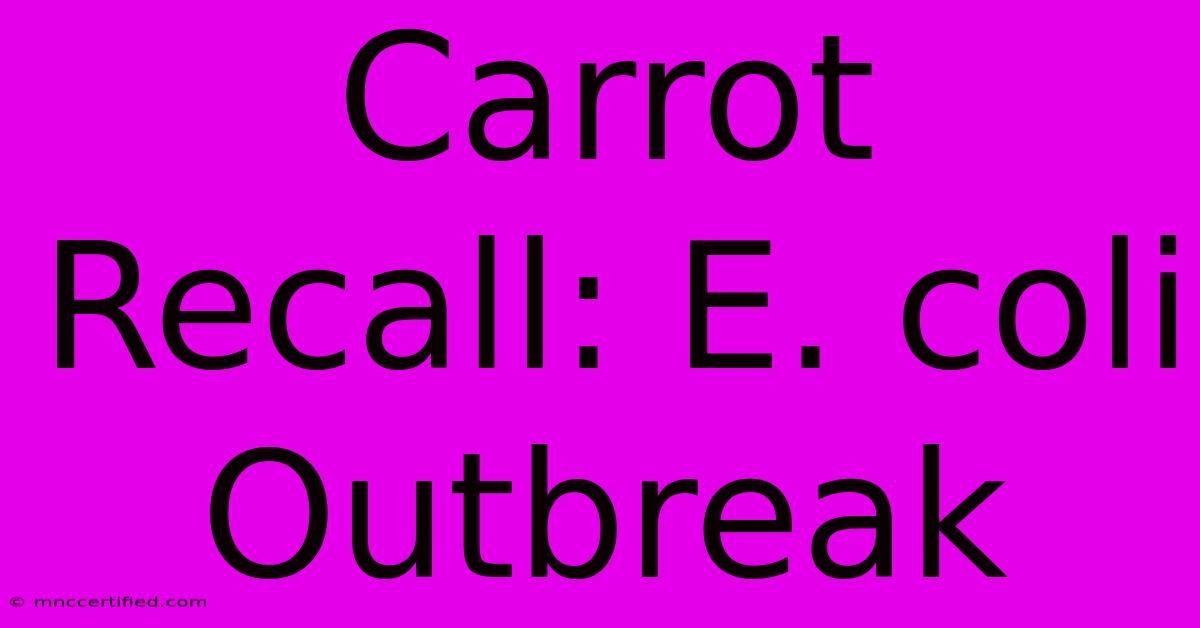Carrot Recall: E. Coli Outbreak

Table of Contents
Carrot Recall: A Comprehensive Guide to the E. coli Outbreak
The recent E. coli outbreak linked to carrots has sent shockwaves through the food industry and raised concerns among consumers. Understanding the recall, its causes, and how to protect yourself is crucial. This comprehensive guide will delve into the details of this serious public health issue.
Understanding the E. coli Outbreak
Escherichia coli (E. coli) is a type of bacteria that can cause various illnesses, ranging from mild diarrhea to severe, life-threatening complications. Certain strains, like the one implicated in carrot recalls, produce toxins that can lead to hemolytic uremic syndrome (HUS), a serious condition affecting the kidneys. The severity of E. coli infection varies depending on the strain and the individual's immune system.
This specific outbreak, traced back to contaminated carrots, highlights the vulnerability of our food supply chain. Pinpointing the source of contamination is crucial for preventing future outbreaks. Investigations often focus on factors such as:
- Farming practices: Contamination can occur at various stages, from the field to processing facilities. Issues like manure management, irrigation water quality, and harvesting techniques can all play a role.
- Processing and packaging: Inadequate sanitation during processing and packaging can facilitate bacterial growth and spread.
- Transportation and storage: Improper storage and transportation can also contribute to bacterial contamination.
Identifying Recalled Carrots
During an E. coli outbreak linked to carrots, it's vital to identify affected products. Check the product labels carefully for any recall notices. These notices typically include:
- Brand name: The specific brand of carrots involved in the recall.
- Product code or lot number: A unique identifier to pinpoint the specific batch of carrots affected.
- Best-by or expiration date: The timeframe when the affected carrots were available for purchase.
- Packaging description: Details about the packaging, such as size, weight, and type.
Government agencies and food safety organizations will release official recall notices through their websites, social media, and press releases. Stay informed by regularly checking these sources.
Protecting Yourself from E. coli Contamination
Preventing E. coli infection is crucial. Here are key steps to take:
- Wash your hands thoroughly: Wash your hands with soap and water for at least 20 seconds before and after handling food, especially raw produce.
- Wash your produce: Thoroughly wash all fruits and vegetables, including carrots, under running water before consumption. Scrub the skin of the carrots to remove any potential surface contaminants.
- Cook your food properly: Cooking carrots to an internal temperature of 165°F (74°C) will kill most harmful bacteria.
- Avoid cross-contamination: Keep raw produce separate from cooked foods to avoid cross-contamination.
- Refrigerate properly: Store carrots and other produce at the correct temperature to prevent bacterial growth.
Symptoms of E. coli Infection
If you suspect you might have contracted E. coli, watch for these symptoms:
- Diarrhea (often bloody): This is a common and significant symptom.
- Stomach cramps: Abdominal pain is frequently associated with E. coli infection.
- Vomiting: This can occur in some cases.
- Fever: While not always present, fever can be a sign of infection.
Seek medical attention immediately if you experience severe symptoms such as bloody diarrhea, high fever, or signs of dehydration. Early diagnosis and treatment are critical, especially to prevent the development of HUS.
The Importance of Food Safety
The carrot recall underscores the vital importance of food safety practices. Both producers and consumers have a role to play in ensuring a safe food supply. Strong food safety regulations, rigorous monitoring, and consumer awareness are essential to mitigating the risk of future outbreaks. By understanding the causes of contamination and implementing preventative measures, we can work towards a healthier and safer food system.
Remember to always check for recall notices and prioritize safe food handling practices to protect yourself and your family.
This article is for informational purposes only and does not constitute medical advice. Always consult a healthcare professional for any health concerns. Information regarding specific recalls should be verified through official government and food safety organization channels.

Thank you for visiting our website wich cover about Carrot Recall: E. Coli Outbreak. We hope the information provided has been useful to you. Feel free to contact us if you have any questions or need further assistance. See you next time and dont miss to bookmark.
Featured Posts
-
Parks Thanksgiving Weekend Announcement
Nov 19, 2024
-
Watch Live Croatia Vs Portugal Group A1
Nov 19, 2024
-
Nations League Scotlands Final Push
Nov 19, 2024
-
Uk Weather Snow And Cold Snap
Nov 19, 2024
-
Trump Dance Nfl Players Celebrate
Nov 19, 2024